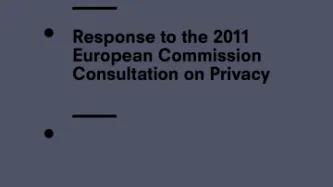Advanced Search
Content Type: Advocacy
The Pakistani government has significantly expanded its communication interception activities. This Privacy International report covers the intelligence services plan to capture all IP-traffic in Pakistan and other initiatives, pointing to gaps in the laws governing surveillance.
Content Type: News & Analysis
Late last year, the newly-elected government of Indonesia began to take steps which are almost unheard of today: reforming government communications surveillance powers.
The much-needed development, on the back of the victory of President Joko Widodo, comes at a critical moment in the country's history as the relationships that Indonesians have with technology are changing and growing rapidly. A recent poll revealed that Indonesians consider technology to have had a mostly…
Content Type: Advocacy
What do Egypt, Kenya, Turkey, Guinea, and Sweden have in common? Despite having a Constitutional right to privacy, they are adopting and enforcing policies that directly challenge this human right.
These states are also up for a Universal Periodic Review this year before the United Nations Human Rights Council. UPRs are a mechanism within the Council aimed at improving the human rights situation in all countries and address human rights violations wherever they occur.
Despite having…
Content Type: Press release
Privacy International welcomes the resolution introduced on Friday by Germany and Brazil to the UN General Assembly, affirming the international human right to privacy and its essential nature to the realization of other rights, and condemning mass State surveillance of individuals around the world.
Should the resolution be adopted, it will be the first major statement by a UN body on privacy in 25 years, since General Comment 16 in 1988 by the Human Rights Committee. It is also the first…
Content Type: Press release
General Assembly Should Pass Strong Resolution on the Right to Privacy in the Digital Age
(New York, November 21, 2013) – The United Nations General Assembly should approve a new resolution and make clear that indiscriminate surveillance is never consistent with the right to privacy, five human rights organizations said in a November 21, 2013 letter to members of the United Nations General Assembly.
After heated negotiations, the draft resolution on digital…
Content Type: Report
New technologies may hold great benefits for the developing world, but without strong legal frameworks ensuring that rights are adequately protected, they pose serious threats to populations they are supposed to empower.
This is never more evident than with the rapid and widespread implementation of biometric technology. Whilst concerns and challenges are seen in both developed and developing countries when it comes to biometrics, for the latter they are more acute due the absence of laws or…
Content Type: News & Analysis
Today is Data Privacy Day, which commemorates the 1981 signing of the Coucil of Europe's Convention 108, the first legally binding international treaty dealing with privacy and data protection. It is celebrated all over Europe, as well as in Canada and the United States since 2008. To mark the occasion, Privacy International, together with other prominent privacy and digital rights organisations, is launching the Brussels Declaration. It urges Brussels parliamentarians and European…
Content Type: Advocacy
On 25th January 2012, the European Commission published a proposal that would comprehensively reform the European data protection legal regime. One aspect of its proposal, a new Regulation (the “Proposed Regulation”),(1) would modernise and further harmonise the data protection regime created by the Data Protection Directive (95/46/EC). Another aspect of the Commission’s proposal, a new Directive(2) (the “Proposed Directive”), would set out new rules on “the protection of individuals with…
Content Type: Advocacy
On 25th January 2012, the European Commission published a proposal that would comprehensively reform the European data protection legal regime. One aspect of the proposal, a new Regulation (the “Proposed Regulation”),1 would modernise and further harmonise the data protection regime created by the Data Protection Directive (95/46/EC). Another aspect of the Commission’s proposal, a new Directive (the “Proposed Directive”), would set out new rules on “the protection of individuals with…
Content Type: Report
This report was submitted to the Joint Committee on Human Rights. Under the current version of the draft Communications Data Bill, records of every person or entity with whom any given individual has communicated electronically would be collected continuously and stored for one year. These records would include the time of the communication and the location from which it originated.
The Communications Data Bill raises a number of concerns with regards to the right to privacy under Article 8 of…
Content Type: Report
This report is the result of research conducted by researchers at Privacy International, coordinated by the London School of Economics and Political Science. The report was commissioned by the International Development Research Centre.
New technologies such as mobile phones and electronic medical record (EMR) systems promise to transform the provision and management of medicine all over the world. In the U.S. alone, billions are being spent on information technologies for healthcare.
Content Type: Press release
An internal Liberal Democrat briefing on Home Office plans to massively expand government surveillance was today passed to Privacy International. The document contains significant evasions and distortions about the proposed 'Communications Capabilities Development Programme' (CCDP), and is clearly intended to persuade unconvinced Lib Dem MPs to vote in favour of the proposal.
The document contains a section entitled 'Remember, under Labour' consisting of a list of the previous government's…
Content Type: Press release
PI, Genewatch and the Council for Responsible Genetics launch the Forensic Genetic Policy Initiative
Today, 60 countries worldwide operate national DNA databases, and at least 34 more are considering putting them in place. The use of DNA evidence in criminal investigations can bring great benefits to society, helping to solve crimes, convict the guilty and exonerate the innocent. However, the mass storage of DNA samples and computerized profiles in databases raises important human rights concerns. Your DNA profile can be used to track you or your relatives. Your DNA sample has the…
Content Type: Report
Following on from their 2009 discussion paper, in 2010 the European Commission published a Communication on changes to the 1995 European Union Directive on data protection. The European Union’s 1995 Directive on data protection is a leading regional instrument for privacy and is often the model for other countries across the globe. The Directive has been integral to pushing back against key surveillance and tracking initiaitives by governments and industry.
In this report we respond to that…
Content Type: Press release
The Council of the European Union today reinforced restrictive measures on EU exports to Iran, banning "exports of equipment and software intended for use in the monitoring or interception of internet and telephone communications by the Iranian authorities".
The Council also added 17 people responsible for grave human rights violations to the list of those subject to a travel ban and asset freeze. An existing ban on equipment for use in internal repression was transferred from the sanctions…
Content Type: Report
This report has been prepared by Privacy International following a six-month investigation into the privacy practices of key Internet based companies. The ranking lists the best and the worst performers both in Web 1.0 and Web 2.0 across the full spectrum of search, email, e-commerce and social networking sites.
The analysis employs a methodology comprising around twenty core parameters. We rank the major Internet players but we also discuss examples of best and worst privacy practice among…
Content Type: Report
This report investigates the probable effect of the proposed UK national Identity Card system on people who are marginalised, who suffer social disadvantage or exclusion, and those who are disabled. The work focuses on the biometrics element of the government’s proposals (specifically facial recognition, ngerprinting and iris scanning).
The Report provides a specific assessment of the recently published biometrics trial conducted by the UK Passport Service (UKPS), and compares these…
Content Type: Report
Proposals for identity (ID) cards have provoked public outrage and political division in several countries. In this paper Simon Davies analyses the key elements of public opposition to ID Card schemes, and profiles the massive 1987 Australian campaign against a national ID card.












